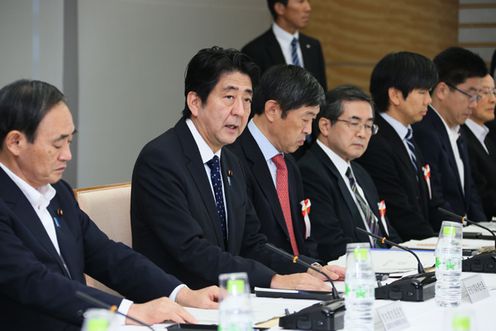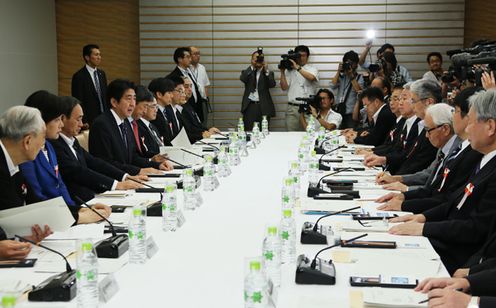Home > News > The Prime Minister in Action > September 2013 > Meeting of the Advisory Panel on Reconstruction of the Legal Basis for Security
Meeting of the Advisory Panel on Reconstruction of the Legal Basis for Security
Tuesday, September 17, 2013

Photograph of the Prime Minister delivering an address at the Meeting of the Advisory Panel on Reconstruction of the Legal Basis for Security (1)

Photograph of the Prime Minister delivering an address at the Meeting of the Advisory Panel on Reconstruction of the Legal Basis for Security (2)
Prime Minister Shinzo Abe held the second meeting of the Advisory Panel on Reconstruction of the Legal Basis for Security at the Prime Minister's Office.
During the meeting, an exchange of views took place among the members in attendance.
The Prime Minister said in his opening address,
"I would like to thank everyone for gathering here today despite your busy schedules. The environment surrounding Japan has gone through dramatic change in the over sixty years since Japan gained its independence from the Occupation and signed the Japan-U.S. Security Treaty.
What has been most extraordinary in recent years is the rapid change in the global balance of power. In particular, the importance of Asia is growing along with the remarkable rise of its emerging economies. However, if we compare the security environment in East Asia to the time six years ago when the Advisory Panel submitted its first report, it must be said that the situation has grown ever more severe.
The seriousness of the proliferation of weapons of mass destruction such as nuclear and chemical weapons, as well as ballistic missiles, is growing, as is the new threat posed by cyber-attacks, which transcend national borders. Progress in technology has made it possible to deal a lethal blow in a short period of time from a far-away country. It must be said that it is now difficult for any country to maintain its peace and safety by itself.
The strength of our nation as well has changed dramatically. We completed swift reconstruction from economic conditions after World War II, in which we had lost everything. As the greatest advanced democratic state in Asia, one which boasts globally prominent economic power, we have become one of the countries sharing the leadership responsibility for global politics. Our prosperity would not be possible without a peaceful and stable international environment. Japan must not just simply appeal for international coordination verbally, we must become a country that proactively contributes to the peace and stability of the world based on a belief in international cooperation. I believe that this proactive contribution to peace is the banner Japan should bear in the 21st century.
In the midst of great change in the security environment surrounding Japan, protecting the lives of the people and the existence of the state is the most important duty of the Government. Thought of in basic terms, the Constitution was written with a priority on the lives of the people, with whom sovereign power resides, and it was written based on the precondition of the existence of the state, which protects the people with whom sovereign power resides. Furthermore, the Constitution is based on the precondition that Japan will exist in cooperation with the international community as a member of that community. I believe that this way of thinking is embodied in the constitution itself, which stipulates basic human rights such as popular sovereignty and the right to life, liberty, and the pursuit of happiness, as well as a belief in international cooperation.
No matter how one interprets the Constitution, we must not draw the conclusion that the lives of the people or existence of the state can be sacrificed. The principle of constitutionalism is founded on the idea that 'acting with the people is of the utmost importance.'
Based on this recognition, I would like to have a concrete discussion from the perspective of considering what is needed to ensure the lives of the people and existence of the state while at the same time realizing peace and stability in the international community, which is the basis for that. I expect today's discussion to take a firm look at changes that have occurred since the enactment of the Constitution and to be the basis for further consideration of how the Constitution should be interpreted to be suitable for the new era."

